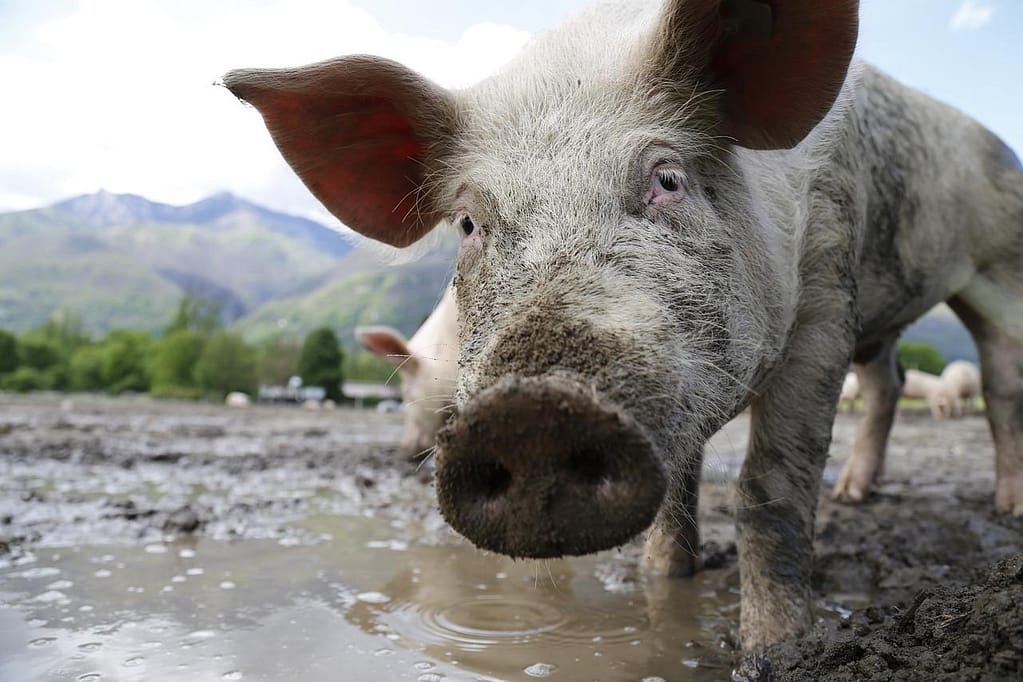I admit, this story used to strike me as odd. Why did Jesus allow demons to be cast into pigs? As an animal lover, it made me sad that the pigs had to die. It seemed like a meaningless waste of life. As the omnipotent God, couldn’t He simply cast the demon’s out of the tortured man and go on His way?
I trust that God has a reason for everything. So, I looked into it further, and the answers are fascinating. Jesus allowed the legion of demons to be cast into pigs as a powerful illustration of God’s sovereignty over lawlessness and the forces of evil. Let’s dig in.
We find this narrative in three of the four Gospels: Matthew 8, Mark 5, and Luke 8. A demon-possessed man approached Him, shouting “What do you want with me, Jesus, Son of the Most High God? I beg you, don’t torture me!” As the Lord commanded it to leave the man, the being(s) requested that they be sent into a herd of pigs. Jesus granted this request:
“Some distance from them a large herd of pigs was feeding. The demons begged Jesus, “If you drive us out, send us into the herd of pigs.” He said to them, “Go!” So they came out and went into the pigs, and the whole herd rushed down the steep bank into the lake and died in the water.” (Matthew 8: 30-32)
So we know what happened; but why did Jesus grant the demon’s request?
A Methophor for Sin
First, let’s look into the animal subjects, and what they may mean biblically. These were not sheep, not camels, not even dogs (which will be the subjects of another post). Jewish law defines pigs as unclean. Kosher animals ruminate (chew their cud) and have fully split hooves (Leviticus 11:3). Animals are still considered unclean if they have only one of the two features (the pig, since it has hooves which are split, but it does not chew its cud—it is therefore unclean for you. (Leviticus 11:7)). So under Jewish law, no eating, touching, or raising of pigs. Some would even go as far as referring to a pig as a davar acher, “another thing,” in an attempt to not even speak it’s name.
One can assume then, that due to the existence of a herd of pigs in this town, that these individuals were either Gentiles, or Jews that were not practicing under the law. Either way, they were not currently seeking to serve the one true God.
UnRepentant townspeople
Next, I noticed the odd response of the townspeople. After the pigs stampede over the cliff, the inhabitants of the area asked Jesus to leave. Seeing His power, and the freedom given to one of their own, one would expect a different response. Perhaps they would bring more of their sick to ask for healing. Or ask Him to teach. I think of the contrasting response of the townspeople after Jesus spoke to the Samaritan woman. He transformed the entire town. The fact that this particular town actually asked the Lord to leave (the only time inhabitants of a town did this) shows me that this town was unrepentant and unbelieving. Stay with me-I will link all of this to the pigs!
Furthermore, the now-freed man wanted to come with Jesus, to follow Him. This was standard for many people (such as Mary Magdalene) and Jesus was not known for turning people away. In fact, I don’t remember any other example of the Lord not allowing someone to follow Him. Instead, the Lord instructed the man to stay in his village and “show his family and friends all that the Lord had done for him.” This evidence further cements my theory that the village was full of unbelievers, with especially hardened hearts, and perhaps a very wicked/demonic atmosphere. The Lord likely knew that these people needed the witness of this transformed man.
A Center of Demonic Activity
A Roman legion maintained between 3,000 and 6,000 men. So “Legion” was likely thousands of demons. Clearly this was an outstanding number. Quite possibly the largest gathering of evil in one town than anywhere else mentioned in the Bible. This was likely not a peaceful, tranquil town. One can imagine that many other wicked practices were at play here other than simply herding pigs.
The Lord often taught in metaphors and parables, so it is no surprise that He was likely teaching a lesson in this circumstance as well. Why did Jesus allow the demons to be cast into a herd of pigs? If Jewish inhabitants resided in the town, Jesus highlighted their sin (with the pig as a prime metaphor) and banished wickedness and lawlessness in a powerful display. And if the townspeople were Gentiles, then this would also be a stunning visual of the Lord’s sovereignty over the forces over evil. As He taught this compelling lesson, He also freed a deeply suffering individual, which is a beautiful miracle in itself.
If you enjoyed this lesson, check out more in-depth Bible studies, such as, Why did Jesus use saliva (spit) for some healings or Did Jesus call the Canaanite woman a dog?





